|
Gazetteer of the State of Maine With Numerous Illustrations, by Geo. J. Varney
BOSTON: PUBLISHED BY B. B. RUSSELL, 57 CORNHILL. 1882. Public domain image from
522 GAZETTEER OF MAINE.
erty is valued at $6,300. The village district is graded, and has a high
school. There is a village library of about 100 volumes. The valu-
ation of real estate in 1870 was $408,145. In 1880 it was $321,861.
The rate of taxation in the latter year was 17 mills on the dollar. The
population in 1870 was 1,593. In 1880 it was 1,771.
South West Harbor, a post-office in Mount Desert
Island, Hancock County.
Spragues Mills, a post-office in Aroostook County.
Springfield lies in the eastern part of Penobscot County,
68 miles north-east of Bangor. It is bounded on the north by Web-
ster Plantation, east by Prentiss, and west by Lee. Upper Sisladobsis
Lake lies in tbe next township south. The surface is agreeably varied
by hills, valleys and broad meadows. Wetherbee Hill is quite an
eminence, having about a mile of declivity. Granite is the predom-
inant rock. The soil is a yellowish loam, easily worked, and yielding
good crops. In 1837 when tbe State offered a bounty on wheat, Sam-
uel C. Clark of this town took the prize, having produced in that year,
1,340 bushels of wheat, besides 435 bushels of other grain. Agricul-
ture is still the principal pursuit, but the largest crop is bay, and many
cattle are raised. Maple, beech, hemlock and spruce are the forest
trees. There are several small ponds scattered over the town, the
largest of which is about a mile long by half a mile in width.
The Mattakeunk and Mattagordas streams have their origin in
this and the adjacent towns. There are on these one cloth-mill, two
grist-mills, one saw-mill for boards and other long lumber, three shin-
gle and one clapboard mill, the latter also making other small lumber.
The town hall is a neat two-story building with a school-room in the
first story. The village is in the eastern part of the town. Its streets
are beautified with rows of maple from three to 20 years of age, and
the houses generally are tasteful and in good repair. The town is on
the stage-line from* Lincoln to Calais. The nearest railroad station
is that on the European road at Lincoln, some 15 miles distant.
This town received its first settlers in 1830. The north half of the
township was granted to Foxcroft Academy, and by its trustees sold
to Bangor parties for thirty-one cents an acre. It was then heavily
timbered with pine and spruce, immense quantities of which Have been
taken from it; and there are large tracts of heavy wood still remaining.
The south half was sold in smaller quantities by the State settlers and
others, and is said to contain some of the best land in Maine.
James Butterfield was the first trader. Other esteemed citizens
have been Elias Breck, Elder Lewis, Azro Clark, B. H. Scribner and
others. The number of old people, some about 90 years of age, speaks
well for the wholesomeness of the climate. Springfield has Congrega-
tionalist, Free Baptist and Methodist societies, and a large and small
church edifice. The number of public schoolhouses is seven ; and the
school property is valued at $1,900. The valuation of estates in 1870
was $122,230. In 1880 it was $105,242. The rate of taxation in the
hitter year was 4 per cent. The population in 1870 was 879. In 1880
it w-os 878.
PREVIOUS PAGE ... NEXT PAGE
This page was written in HTML using a program written in Python 3.2
|
